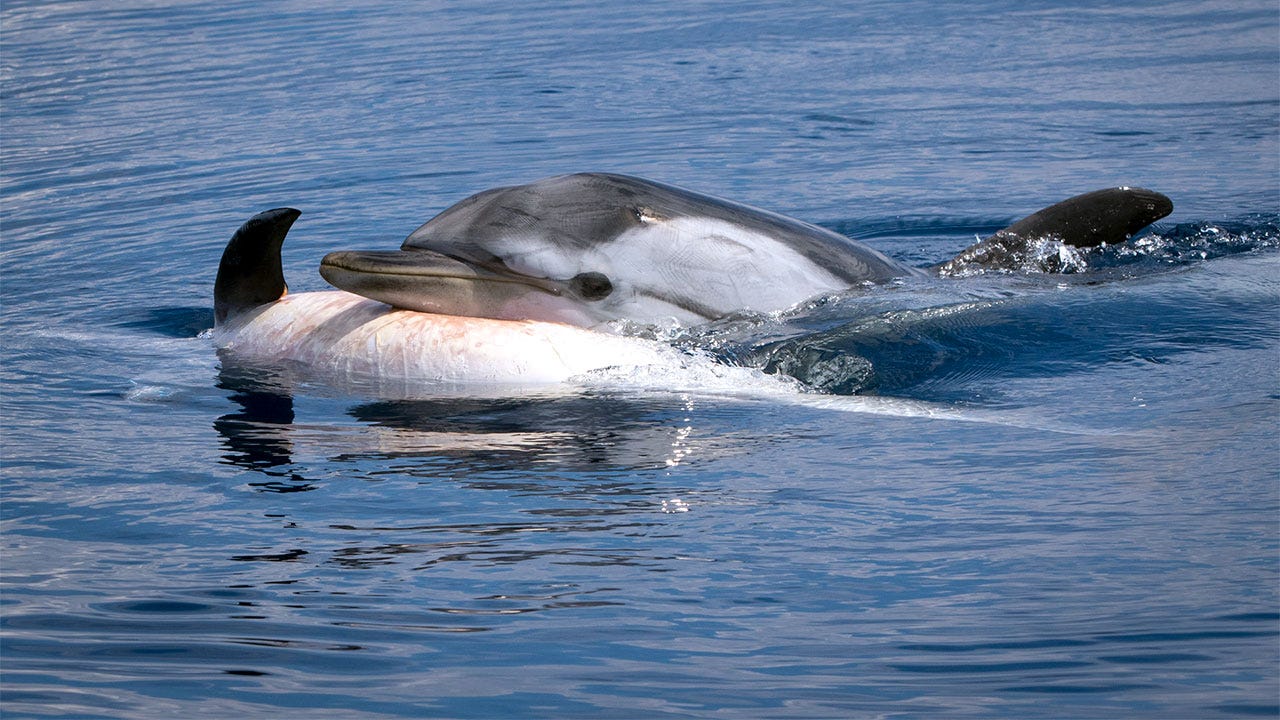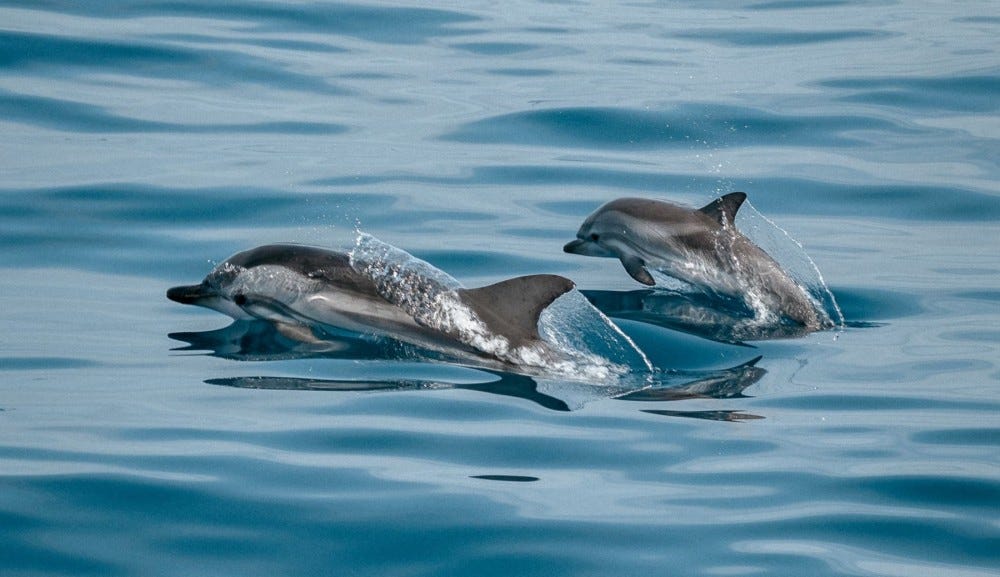It’s a well-known fact that whales and dolphins are among the most intelligent species on the planet—let alone in the ocean. With large, complex brains they are capable of things that set them apart from many other animals.
Sperm whales have the largest brains of any species, while dolphins have a brain-to-body ratio second only to humans. In general, large-brained creatures tend to share certain traits, like long lifespans, rich social lives, complex behaviours, and extraordinary care for their young.
But the intelligence of whales and dolphins runs deeper than their cognitive abilities—it extends into emotional intelligence too, shaping how they connect, communicate, and respond to the world around them. It’s believed that navigating the complex interactions that come with living in such strong social circles requires more brain power and so leads to more complex emotions like grief. It’s known as the social brain hypothesis.
This ability is due to their spindle neurons which are specialised brain cells linked to reasoning, communication, and self-awareness—traits we often associate with deep thinking. Even more striking, the part of their brain that processes emotions (the limbic system) appears to be more complex than our own. As neuro-expert Lori Marino puts it, “A dolphin alone is not really a dolphin; being a dolphin means being embedded in a complex social network…even more so than with humans.”
One of the most harrowing examples of their emotional depth is their ability to grieve. A mother whale carrying her deceased calf unwilling to let go. Baleen whales heard mourning for a companion that has beached. Their cries when separated from their pod during a hunt. Or their distress calls when put in captivity. These aren’t just their survival instincts kicking in; they are reflections of a deep, undeniable loss.
Grief is one of the most powerful emotions—arguably as powerful as love itself. It is a response to losing something irreplaceable, something precious to us. And just as elephants, primates, and even birds have been observed mourning their dead, so too have whales and dolphins.
Though they can’t articulate it in words, their behaviour speaks for itself.
For years, the idea that whales and dolphins could experience grief was seen as sentimental, unscientific, or even anthropomorphic. But research is now proving what shouldn't come as a surprise —that by living in these complex societies, whales and dolphins are capable of feeling deep, emotional loss when a member of their pod dies.
A growing body of evidence shows that at least 20 species of cetaceans exhibit grief-like behaviours, often referred to as postmortem attentive behavior. In simple terms, this means they stay with their dead, physically interacting with the body long after life has left it. This phenomenon has been documented in sperm whales, bottlenose dolphins, short-finned pilot whales, and even baleen whales like humpbacks.
The most heartbreaking display of grief comes from mothers who can’t accept their loss. On many occasions scientists and witnesses have observed cetacean mothers carrying their dead calves for hours, days, even weeks—lifting them to the surface, nudging them, and diving to retrieve their body when it slips away. Some scientists suggest an instinctive attempt to resuscitate their calf as a reason for their behaviour but getting more data on the subject is challenging as these events are usually during chance encounters.
One of the most well-documented cases is Tahlequah (J35), the orca mother who carried her stillborn calf for 17 days and across 1,000 miles trying to keep up with her pod. And a Cuvier’s beaked whale in the Bay of Biscay was observed nudging her dead calf in what appeared to be an attempt to revive it. Similar behaviour has also been recorded in sperm whales, pilot whales, and bottlenose dolphins, with mothers pushing their lifeless young through the water, unwilling to leave them behind.

It’s not just mothers who grieve either; in tight-knit pods, members have been seen unable to leave the bodies of deceased companions, touching them gently or circling them for long periods. In captivity, bottlenose dolphins have shown depressed behaviour—after losing a tankmate they have been seen lying motionless at the bottom of their enclosure. Filipe Alves of the University of Porto conducted a study into Atlantic spotted dolphins and their mourning behaviour which lasted for hours after the death of a calf. Filipe suggests that living in matrilineal or multi-generational pods, like whales and dolphins often do, explains some of their grief: “When they spend a lifetime together, sometimes 60 years or more, yes, I believe they can grieve.”
Knowing this, it’s clear that whales and dolphins don’t just recognise death—they feel its weight just like we do. Just like other highly social animals do. Elephants return to the bodies of fallen companions, touching and even carrying their bones. Chimpanzees have been seen sitting in silence beside their deceased, while giraffes stand guard over fallen herd members.
The more we learn about their intelligence, the harder it is to ignore just how deep emotional connections can run in the animal kingdom. Whales and dolphins (among others) feel loss, they remember, and they suffer in ways that we can no longer dismiss.
For me, Jeremy Bentham (an early animal welfare advocate) summed it up best in 1789 when he asked: “The question is not, Can they reason? nor, Can they talk? but, Can they suffer?”

Here at Beached we are building a community that can put our brains and resources together to highlight and fund solutions to the problems facing whales and dolphins. I hope you’ll join our humble community and click subscribe for free or support our work by purchasing the paid subscription.
All Beached posts are free to read but if you can we ask you to support our work through a paid subscription. These directly support the work of Beached and allow us to engage in more conversations with experts in the field of marine conservation and spend more time researching a wider breadth of topics for the newsletters. Paid subscriptions allow us to dedicate more time and effort to creating a community and provide the space for stakeholders to come together, stay abreast of each other’s work and foster improved collaboration and coordination.
One day Beached hope to donate a large percentage of the revenue from paid subscriptions to marine conservation organisations and charities to support their work too. Working together, we can reverse the degradation of our oceans.
Amie 🐋






I worked with chimpanzees and I learned that what we don’t understand about animals and their capacity for emotions is A LOT!
adding to the list, crows and magpies grieve as well. it's a well documented behaviour! Seeing empathy in so many places just shows how natural, and beyond human that feeling is.